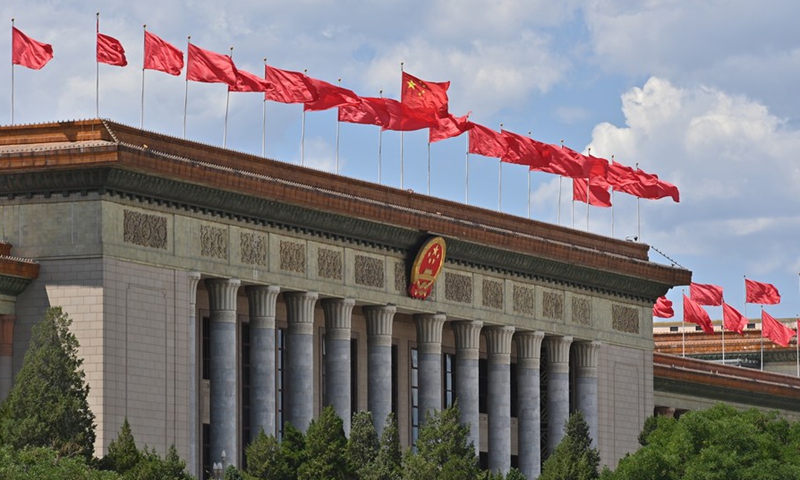Nation confident in overcoming challenges under strong leadership of CPC
China is set to enter the two sessions period on Monday, focusing the world’s attention on how one of the most important political events in the country will set priorities and plans involving the economy, diplomacy, military, and social development for 2024. This year marks the 75th anniversary of the founding of the People’s Republic of China and is a key year for achieving the goals outlined in the national 14th Five-Year Plan (2021-25). At this critical juncture, China’s two sessions are set to send a refreshed strong signal to the world that China will remain firmly committed to promoting global common development and prosperity with its high-quality development.
The second session of the 14th National People’s Congress (NPC) will open in Beijing on March 5. The second session of the 14th National Committee of the Chinese People’s Political Consultative Conference (CPPCC) will begin on March 4, also in Beijing. During what is collectively known as the two sessions, Chinese policymakers are set to release a set of social and economic development goals for this year, including the annual GDP growth target, as well as policies to achieve them.
Over 3,000 reporters from home and abroad are ready to report on the important event, while foreign media outlets have been speculating about the social and economic development targets and policies that will be revealed, especially how new productive forces and reforms in the key sectors including the financial sector will provide new growth momentum for the country and the world. Generally, policymakers are widely expected to set a GDP target of around 5 percent for the year and come up with intensified macro-policies, offering more confidence for the world’s second-largest economy, according to analysts and recent tone-setting meetings.
Global expectations
Today’s world faces multiple risks and challenges. The global economy has been weighed down by protectionism and the abuse of the security concept by some Western countries, geopolitical tensions are heightened, and artificial intelligence (AI) and climate change, among other factors, pose a new set of challenges. Against this backdrop, the international community expects China’s answers to add certainty and new momentum of growth to the world.
“I expect that this most important Chinese meeting will address the strategic challenges based on President Xi Jinping’s conception of a community with a shared future for humanity, which could be a specification of the Global Development Initiative, the Global Security Initiative and the Global Civilization Initiative,” Helga Zepp-LaRouche, founder of Germany-based political and economic think tank the Schiller Institute, told the Global Times.
Zepp-LaRouche said that she is hopeful the two sessions as one of China’s most important political events will show the world the way forward in terms of how to overcome the mistaken view that a country or a group of countries must defend its interests against another group by any means necessary.
Wirun Phichaiwongphakdee, director of the Thailand-China Research Center of the Belt and Road Initiative and researcher at the Thailand-China Strategic Research Center at the National Research Institute of Thailand, told the Global Times that he greatly expects to learn about China’s economic direction and policies in 2024 from the upcoming two sessions, which will also set the direction for economic and trade cooperation between China and other Asian countries, especially Southeast Asian countries.
Currently, the world is at a threshold of seeing great improvement in productivity and the development of AI is expected to bring mankind to a new stage. As China is the world’s second-largest economy, which has a profound impact on the global economy, I believe China’s AI innovations will make contributions to the world in this regard, Wirun said.
Almost every Government Work Report over the past several years has come up with arrangements for the joint building of the Belt and Road Initiative. It’s expected that this year’s two sessions will further discuss and make arrangements in the implementation of the eight major steps China will take to support high-quality Belt and Road cooperation, Wan Zhe, an economist and professor at the Belt and Road School of Beijing Normal University, told the Global Times.
In addition to foreign cooperation, China has ramped up efforts to promote high-level opening-up over recent years. Foreign companies operating in China have strong expectations for this year’s annual two sessions, eyeing greater opportunities from Chinese modernization.
“We always attach great attention to industrial policies to be announced in a wide range of sectors, including carbon neutrality, healthcare, digital economy and AI, as we hope to get involved in those sectors to explore more opportunities,” Han Jingjing, a sales and marketing vice president of the Swiss air quality technology company IQAir China, told the Global Times on Friday.
Along with the continuous improvement of China’s business climate, the Chinese government now provides a more convenient and efficient investment environment and services for foreign enterprises. We expect that the government will further lower the threshold for foreign investment, which will greatly elevate their confidence in investing in China while reducing investment risks and cost, Han said.
Injecting energy into world
At the beginning of 2024, China’s consumption sector extended its robust rebound, macro-economic policies are being intensified, and opening-up and cooperation are being conducted in an orderly fashion. Some international institutions have upgraded their forecasts for China’s GDP growth rate and many multinationals have briskly increased investment in the market for more opportunities. Against the backdrop of a sluggish global economy, China will continue to be an important engine for global economic growth.
Judging from the economic goals set by Chinese provincial-level regions during their local two sessions, the Government Work Report will likely set an annual growth target of around 5 percent for 2024, Cao Heping, an economist at Peking University, told the Global Times on Friday.
Cao said that the country’s deficit-to-GDP ratio may be set at around 3.5 percent this year to support the development of new productive forces.
A meeting of the Political Bureau of the Communist Party of China (CPC) Central Committee held on Thursday to discuss a draft government work report pointed out that the country will strive to achieve its annual economic and social development goals.
Great efforts should be made to advance the construction of a modern industrial system and accelerate the development of new productive forces, according to the meeting.
“The emphasis on new productive forces at the top meeting underlines the importance of tech innovations in China’s economic development. The new economy supported by new productive forces will become a main driver of the economic growth this year,” Cao said.
New productive forces represent high technology, high efficiency and high quality. They provide strong support for the high-quality development of China’s economy, developing China into a great modern socialist country in all respects, enhancing China’s international competitiveness, and meeting people’s aspirations for a better life, analysts said.
The core of developing new productive forces is innovation, which also includes regulatory innovation. The authorities need to provide the best business environment for enterprises, especially private companies, so that they will have the vitality and impetus to make breakthroughs in developing new productive forces, Wan said.
“Despite temporary challenges to the Chinese economy and short-term fluctuations in the capital market, China will be able to overcome a series of challenges faced by the economy following policy adjustments and strengthened regulations,” Cao said.
Being committed to people-centered development, the centralized and unified leadership of the CPC Central Committee with Xi at the core is the source of confidence, Cao said, noting the institutional strength of socialism with Chinese characteristics of pooling resources behind major undertakings will provide strong support for the upswing in economic recovery.
China’s economy grew by 5.2 percent year-on-year in 2023, staying above last year’s official GDP target of around 5 percent, and underscoring the resilience and potential of the Chinese economy in the post-COVID-19 era.
(Global Times)




